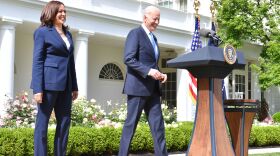Eloise LaCour clutches her dolly as a nurse takes her blood pressure, then swabs the 3-year-old's delicate arm with alcohol.
"Tickle tickle," says Eloise's mom, Angelica LaCour. She's trying to get a smile. "Mommy's going to hug you, OK?"
A Stanford University nurse carefully gives the little girl her shot. Eloise is one of 144 children in the country who are part of a Phase 1 clinical trial to test Pfizer-BioNTech COVID-19 vaccines in the most adorable of study cohorts — those 5 and younger.
"That's it!" exclaims nurse manager Richard Brotherton, pulling the needle out of Eloise's arm.
Eloise barely flinches. In fact, under her mask it looks like she's smiling.
"Look at you! Brave kid!" beams her mom.
The next day, Eloise has yet to complain of any side effects — not even tenderness at the injection site.
While some people are still hesitating about the highly effective vaccines, let alone enrolling their kids in clinical trials, Angelica LaCour stresses the bigger picture.
"I think it's just really important to highlight that we're not going to get to herd immunity as a country if children are not vaccinated," she says. "We don't know the long-term impacts of the virus. And we know that this is a well-tolerated vaccine that's saving people's lives. And it's important that our children get that as well."
Still, she and her husband Chris were initially nervous about enrolling their only daughter in the early trial. They are not sure they'd be any less anxious when the official rollout of vaccines for the youngest Americans takes place.
And while Eloise is healthy, "we know that there's a lot of other families with kids with vulnerabilities where COVID-19 is potentially life-threatening," Angelica says. "And so being part of making this a reality for those families is something that is really meaningful to us."
Second dose
After three weeks, it's time for Eloise's second poke. She has decided to dress up as Princess Merida from the Pixar movie Brave. This time, she squirms a little more but still doesn't cry.
That night she complains her head hurts a little and that her arm is sore. Nothing that can't be solved with a low dose of Tylenol, says her mom. Otherwise she's running around with "lots of energy," says Angelica.
Now, even before her father has gotten his second shot, Eloise is one of a small number of little kids in the country to be fully vaccinated. The family is excited to start planning summer vacations.
Stanford scientists will track Eloise for the next two years to make sure all goes well. The next phases will involve enrolling many more children, eventually thousands, to study accurate dosage, vaccine safety, immune response and efficacy.
Pfizer is planning to apply to the Food and Drug Administration in September for emergency authorization of the vaccine for children aged 2 to 11. Moderna is also conducting clinical trials in small kids for its vaccine. The FDA has already approved vaccinating those 12 and older.
Fall rollout expected
Currently there are a lot more families willing to volunteer in trials than spaces available in the trials. Historically it's much easier to recruit kids for studies during active disease outbreaks. COVID-19 has killed more than 300 kids across the country.
"That actually represents one of the top 10 causes of death in children right now," says Dr. Yvonne Maldonado, a pediatric infectious disease expert at Stanford Medicine who is leading the trial. "And there have been thousands of children hospitalized."
But not all parents are so eager to vaccinate their kids. The Kaiser Family Foundation recently released a survey showing fewer than a third of parents say they plan to get their kids COVID-19 shots as soon as it's possible. Another 32% said they would "wait and see."
Reluctance, especially early on, is not new. It started in the early 1800s when the first smallpox vaccine was developed. However, hesitancy is more rampant now than ever before, according to Dr. Myron M. Levine, associate dean for global health, vaccinology and infectious disease at the University of Maryland.
"Hardcore anti-vaxxers exist in a way that simply could not exist in the 1970s or even the 1980s because we didn't have the connectivity that we have now," says Levine.
The internet and social media platforms provide a ripe environment for anti-vaccine sentiment. In the coming months Levine hopes parents will be swayed by the data from early trials rather than misinformation. He says vaccinating kids is critical to stamping out COVID-19.
"You have to have a very, very high level of coverage," he says, " to keep that bad genie in the bottle."
Copyright 2021 KQED






